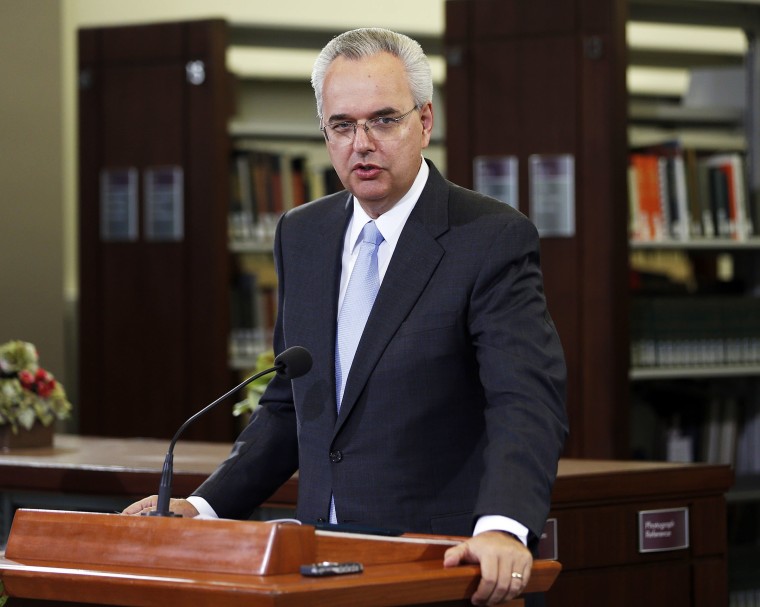The recent excommunication of a high-ranking leader of the Church of Jesus Christ of Latter-Day Saints was an unusual move that casts a light on the practice, historians and members of the Mormon church said.
Church Elder James J. Hamula "was released as a General Authority Seventy of The Church of Jesus Christ of Latter-day Saints" following church disciplinary action on Tuesday, said church spokesman Eric Hawkins. A reason for the removal was not given.

The church would not say why Hamula was excommunicated, but confirmed his ouster was not because of "disillusionment or apostasy," meaning rejection of or advocacy against church doctrine or teachings. Efforts by NBC News to reach Hamula by phone were not successful.
It's the first time a leader was excommunicated by the church in nearly 30 years, scholars told NBC News.
"This is a very, very rare occurrence. It's like a Cardinal in the Catholic Church being defrocked," said Mormon historian Gregory Prince.
With the spotlight on the church ousting one of its leaders, here's a look at why the Mormon church would consider excommunicating someone, and some of the most high-profile cases.
What is excommunication and why does it happen?
When someone is excommunicated, they are no longer considered part of the Mormon church, his or her name is removed from church records and all of the sacraments that have been performed on the person are considered suspended, said Matthew Bowman, a Mormon scholar and associate professor of history at Henderson State University.
An article on the church's website states that "the Church will not discuss the proceedings of a disciplinary council." Prince said that church leadership is very secretive when it comes to why someone was excommunicated and that the confirmation was "unusual."
"They're stepping on ground that I haven't seen them step on to before," Prince said.
In general, aside from apostasy, Prince said church cannon orders that disciplinary councils are held for church leaders for "serious transgressions" that include what the church considers sexual sins, such as adultery and same-sex relations, or crimes like embezzlement or fraud or other charges.
Hamula was a member of a high order of priesthood called the First Quorum of the Seventy before he was removed.
Bowman said he believed the church confirmed that Hamula's removal was not for reasons of apostasy to avoid the narrative that one of its leaders had suffered a crisis of faith.
"It reflects, I think, a growing worry that the church has experienced ... over people leaving the church and doing so in a very high-profile way," he said.
Disciplinary action for someone like Hamula would be determined by a council of the church's highest governing bodies, the First Presidency and Quorum of the Twelve Apostles, Bowman said.
For average members of the church, discipline and excommunication is determined at disciplinary councils at lower levels and largely at the discretion of local leaders, he added.
What are some high-profile examples?
The last time a church leader is known to have been excommunicated was in 1989, after George P. Lee, who was Native American, called Mormon leaders racist, according to the Associated Press. At the time, the church said he was removed for "apostasy and other conduct unbecoming a member of the church."
Before that, the last excommunication of a church leader was Richard R. Lyman for adultery in 1943.
There have been several high-profile excommunications of church members in recent years, many of which "have been for apostasy," said Bowman.
Prince added that such cases have increasingly "become a source of trouble for the church, and something I think that they're doing their best to tamp down."

In June 2014, Kate Kelly, a co-founder of Ordain Women, a Mormon feminist movement that seeks equal standing for women in the church, was excommunicated in an ouster that made national headlines. The Mormon church currently reserves top leadership positions for men and does not allow female lay clergy.
And in February 2015, John Dehlin, popular Mormon podcaster who supports gay rights and the ordination of women, was also excommunicated.
"Excommunication is actually a very violent procedure. Within faith tradition, it's a spiritual death, which to Mormons is worse than a physical death," Kelly said.
"It also means that you don't get to be with your family in the eternity," she said. "They essentially kicked me out of heaven."
Kelly said she believes the church should be more forthcoming about the reasons behind Hamula's ouster, considering his high position.
"I do think we deserve answers about why, and I think the church is largely protecting themselves by not disclosing — because average members of the church think that this person was called of God to lead them," she said.
Can someone come back from excommunication?
If someone is excommunicated, there are ways for them to be rebaptized into the church after approval from a disciplinary council following an extended period of redemption.
"Excommunication is spoken of as being part of a process of repentance. The person is told, 'You've committed this sin.' To repent of this sin, you must first be excommunicated before you can redeem yourself from it," Bowman said. "I would be terribly surprised if that were not presented to [Hamula]."
Church leader Lyman was rebaptized into the church 11 years after his excommunication.
Kelly appealed her excommunication, but was denied and said she would not consider being rebaptized because she could not repent for her beliefs.
"I never consider getting rebaptized because that would mean being part of an institution where I would couldn't tell the truth or be my authentic self," she said.
